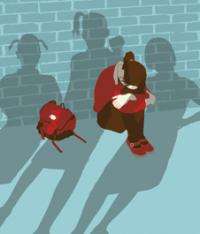Cooling the burn

"When we talked to the girls about cyberbullying on Facebook, it was like an explosion. They all knew someone who’d been bullied that way."
So reported senior communication studies major Hannah McCulloch, who, with junior Brittany Troy, led an antibullying training session for Boston teenagers last semester.
McCulloch and Troy developed the two-hour program themselves, as a project for their capstone course, “Organizational Communication Training and Development,” taught by associate communication studies professor and associate vice provost Elise Dallimore.
By the end of the semester, the program had had its real-world debut in a class of teen girls, courtesy of the Boston nonprofit Health Resources in Action (HRIA).
HRIA invites girls who act as peer leaders at such Boston organizations as Sociedad Latina, the South Street Housing Development and the Hyde Park YMCA to weekly sessions on a variety of public health issues. Afterward, the teens are asked to share what they’ve learned within their communities and their schools.
To create an antibullying program for these girls, McCulloch and Troy immersed themselves in gaining the necessary theoretical background and practical skills. Then they developed a needs assessment and a training contract for HRIA, designed the curriculum, piloted it in Dallimore’s class to get feedback, delivered it to the HRIA teens and, ultimately, evaluated its effectiveness.
“Hannah and I spent endless hours in the library brainstorming and doing research,” said Troy.
Dallimore’s capstone, McCulloch said, “was a really intense class, one of the most rewarding I’ve taken at Northeastern.
“We would learn something on a Tuesday, take it to our clients on a Thursday, then go back to class on Friday and talk about what the clients had said,” McCulloch continued. “By the end, we understood how to train, and what impact our training had on people.”
Best of all, McCulloch and Troy feel they helped shed some light on the hot-button issue of bullying — especially cyberbullying.
Troy said the teens she talked with didn’t fully understand the relationship between cyberbullying and suicide.
“They were shocked when we showed them an article about Phoebe Prince,” she said, referring to the South Hadley, Massachusetts, 15-year-old who killed herself last year after allegedly being bullied by classmates.
McCulloch and Troy advised the teens on how they could address cyberbullying without becoming victims themselves — such as by anonymously reporting abusive remarks to Facebook. “The girls were really receptive to that approach,” said McCulloch.
HRIA is one of more than 225 programs that partner with Northeastern through the Center of Community Service to enlist students’ help.
Laurie Jo Wallace, the HRIA training director, praised what McCulloch and Troy accomplished. “They were very responsible, very focused and created a great two-hour curriculum we will definitely use in the future,” Wallace said.
In fact, said Dallimore, “Health Resources in Action was so impressed they’re planning to market this training to organizations all over the country.”

















